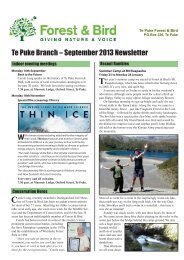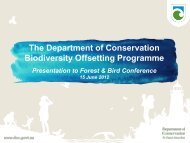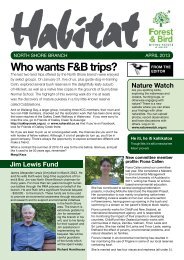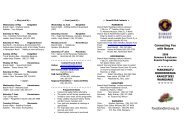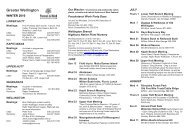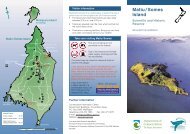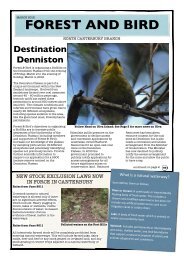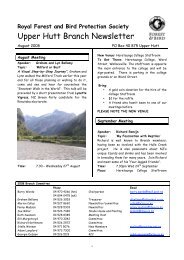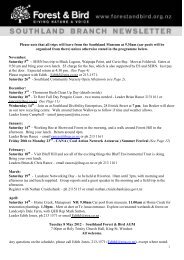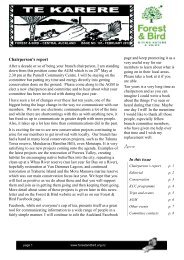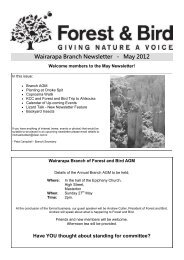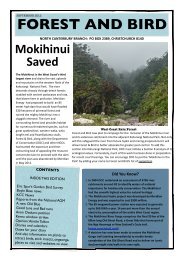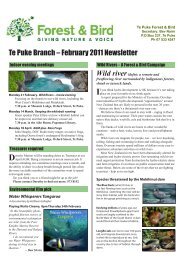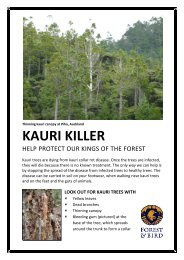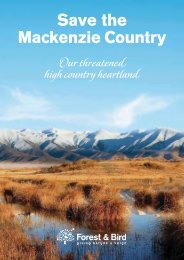Ashburton - Forest and Bird
Ashburton - Forest and Bird
Ashburton - Forest and Bird
Create successful ePaper yourself
Turn your PDF publications into a flip-book with our unique Google optimized e-Paper software.
Wrybill research on Rakaia River<br />
Over the last three years DOC has undertaken<br />
research on wrybill in the upper Rangitata River.<br />
We have good information on distribution, key<br />
breeding areas, proportion of nests predated <strong>and</strong><br />
flooded, <strong>and</strong> have begun to get an idea of<br />
productivity – that is, the number of chicks each<br />
female produces per year. What we are learning<br />
indicates that the population is in decline. Other<br />
studies on wrybill have shown that for a<br />
population to remain stable, a female must<br />
produce 0.75 juveniles per year. Last season, the<br />
females that we monitored produced a third of<br />
that figure.<br />
This year, we have an opportunity to research<br />
wrybill in the upper Rakaia River. Contact Wind<br />
Limited has recently been granted resource<br />
consents for a 168 turbine wind farm in the North<br />
Isl<strong>and</strong>, on the coast between Raglan <strong>and</strong> Port<br />
Waikato. As part of the project Contact Wind Ltd<br />
is required to undertake a long term programme<br />
in the upper Rangitata River to offset any<br />
potential biodiversity losses (deaths) which may<br />
occur when wrybill fly north to their winter<br />
feeding grounds. Contact intend to do this by<br />
establishing a programme to enhance the<br />
breeding success of wrybill <strong>and</strong> the South Isl<strong>and</strong><br />
Pied Oystercatcher (SIPO) nesting in the upper<br />
Rangitata River. This will involve determining<br />
current productivity of wrybill <strong>and</strong> SIPO in the<br />
upper Rangitata River over the next 2-3 years<br />
before undertaking a mammalian predator control<br />
programme. This work will complement Project<br />
River Recovery, a predator control programme<br />
undertaken in the Tasman River, <strong>and</strong> provide<br />
DOC with further information on how effective<br />
mammalian predator control is at increasing<br />
productivity of SIPO <strong>and</strong> wrybill in braided rivers.<br />
Contact’s involvement provides the department<br />
with an opportunity to use its resources in the<br />
upper Rakaia River while still gaining information<br />
of wrybill productivity in the upper Rangitata<br />
River. There has been no research done on wrybill<br />
in the upper Rakaia River for over 30 years. At<br />
that time the upper Rakaia River, along with the<br />
upper Rangitata River, was considered stronghold<br />
populations for the species. DOC now has an<br />
opportunity to survey <strong>and</strong> research this<br />
population, which will assist in a better<br />
underst<strong>and</strong>ing of the species nationally. We will<br />
still be undertaking all other work such as weed<br />
control as normal in the upper Rangitata River.<br />
Our objectives for research in the upper Rakaia<br />
River over the next six years will be:<br />
1. undertake surveys to obtain an estimate of<br />
abundance of wrybill<br />
2. map wrybill distribution<br />
3. monitor up to 40 pairs to determine<br />
productivity<br />
4. undertake video monitoring <strong>and</strong> DNA analysis<br />
of predated nests to determine predator guilds<br />
5. underst<strong>and</strong> location <strong>and</strong> abundance of<br />
southern black-back gulls <strong>and</strong> harriers<br />
6. determine if avian control is beneficial in<br />
improving wrybill productivity<br />
Wendy Sullivan, DOC Geraldine<br />
Water meetings The <strong>Ashburton</strong> Zone<br />
Committee has put together a draft programme<br />
for water management which you are invited to<br />
review <strong>and</strong> give feedback on before it is finalised.<br />
Public meetings are being held <strong>and</strong> written<br />
comments are welcome – please send by Oct 21.<br />
Community Engagement meetings:<br />
Wed 28 Sept, 7-9 pm, Rakaia Church Hall<br />
Thurs 29 Sept, 7-9 pm, <strong>Ashburton</strong> District<br />
Council Office<br />
Fri 30 Sept, Mayfield Memorial Hall<br />
Fantails How are the fantails in your area?<br />
Fantails often do not survive snowfalls <strong>and</strong> despite<br />
it having been a generally warm winter, there have<br />
been two snowfalls which may have caused fantail<br />
deaths. It would be interesting to know how they<br />
are faring – please keep an eye out for fantails.<br />
Royal <strong>Forest</strong> <strong>and</strong> <strong>Bird</strong> Protection Society – <strong>Ashburton</strong> Branch<br />
5



